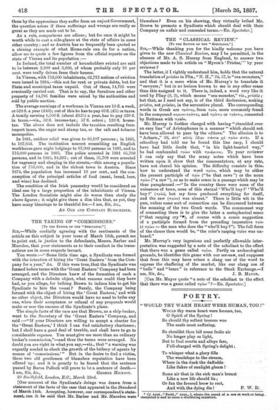THE " CLASSICAL REVIEW." [To TRH EDITOR Or von "
SPRCTATOR:1 Sra,—While thanking you for the kindly welcome you have given to the new Classical _Review, may I be permitted, in the absence of Mr. A. S. Murray from England, to answer two objections made to his article on " Myron's 'Pristas, " by your reviewer ?
The latter, if I rightly understand him, holds that the natural
translation of pristas in Plin., "N. H.," 34, 57, is "sea-monsters," and that it is a mere whim of Mr. Murray's to translate it " sawyers ;" but in no lexicon known to me is any other sense than this assigned to it. There is, indeed, a word very like it used by Pliny (9, 3), which means "sea-monster," viz., pristis ; but that, as I need not say, is of the third declension, making pristes, not pristas, in the accusative plural. The corresponding. words in Greek are Irplorns, from wpica, more commonly found: in the compound xvturo-n-planK, and s-plorq or rpilarre, connected by Buttman with wpik.
Mr. Murray is further charged with having " stumbled over
an easy line" of Aristophanes in a manner " which should not have been allowed to pass by the editors." The allusion is to " Acharn.," 36, dx),' airr4 4E1u sierra xai wel4n, ria.iv. If a schoolboy had told me he found this line easy, I should have had little doubt that, " in his light-hearted way," he had confounded =pi,. with IrpteilAsvoc. To your reviewer I can only say that the many notes which have been written upon it show that the commentators, at any rate, have not shared his opinion. The difficulty consists in this, how to understand the word spiny, which may be either the present participle of s-pie (" he that saws ") or the noun spies ("a saw "), so as to make sense in a passage which may be thus paraphrased :—" In the country there were none of the nuisances of town, none of this eternal ' Who'll buy ?" Who'll buy ?' (wpte), but my farm produced everything for itself,. and the saw (pie.) was absent." There is little wit in the pun, unless some sort of connection can be discovered between the meaning of the two Greek words. The commonest way of connecting them is to give the latter a metaphorical sense (" that rasping cry "*), of course with a comic suggestion of a participle formed from the preceding imperative spin.
= the man who does the " who'll buy P"). The full force of the clause then would be, "the crier's rasping voice was un- heard."
Mr. Murray's very ingenious and perfectly allowable inter- pretation was suggested by a note of the scholiast to the effect that there was a game called wpi.s. Partly on archcoological grounds, he identifies this game with our see-saw, and supposes that from this may have arisen a slang use of the word to. express the chaffering of the market, like our slang use of " bulls " and "hears " in reference to the Stock Exchange.—I.
[Can Mr. Mayor quote "a note of the scholiast to the effect that there was a game called a-piars"?—ED. Spectator.]














































 Previous page
Previous page